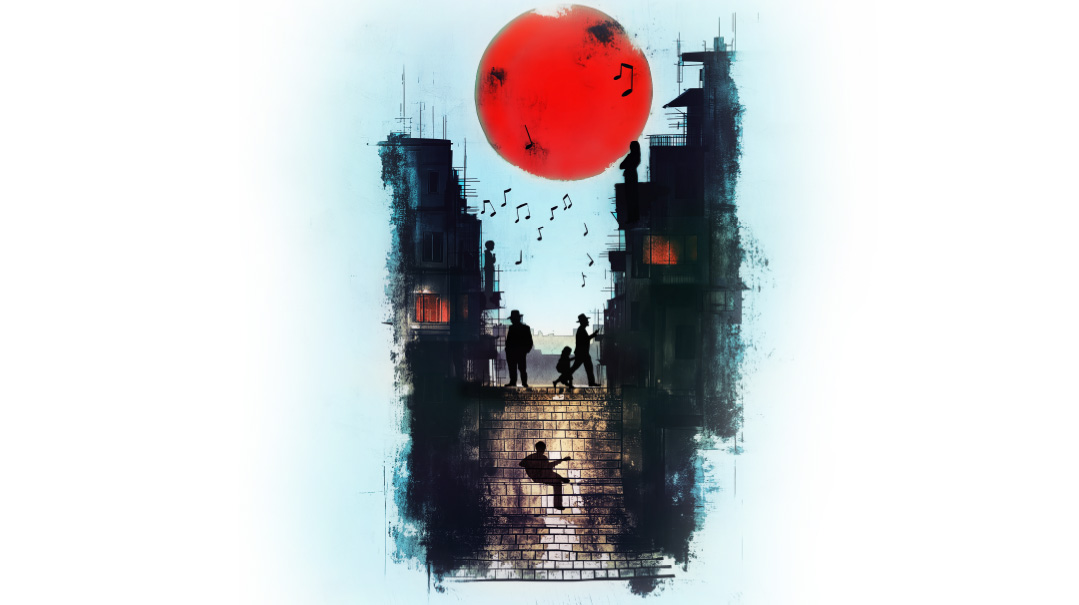Last Stop: Chapter 12
| May 9, 2023“Yudi,” he gasps out. He can’t find Yudi when he reaches for him. Everything around him is fire and black smoke, acrid and deadly

The desk burns like an effigy, like a Lag B’omer bonfire gone horribly wrong. Naftali is closer than he’s ever been to a fire, and it’s so much hotter than he’d imagined. He is gagging, bent over and stumbling as he tries to take action.
They have to escape. They have to call for help. They have to—
“Yudi,” he gasps out. He can’t find Yudi when he reaches for him. Everything around him is fire and black smoke, acrid and deadly, and he can only see shadows moving in the room. A large figure looms in the smoke, making its way to him.
It isn’t Yudi. It’s Eliezer, moving with determination, his jacket pressed to his mouth to filter out the smoke. The rage is gone from his face. Instead, he looks terrified, eyes flickering over Naftali as he seizes his hand. He tugs at him as if they’re still little boys — Naftali’s older brother running into a fire to pull him to safety — and Naftali wants nothing more than to follow him out.
But there is an even littler, even needier boy somewhere in the room, all on his own with no one to retrieve him.
“Yudi,” Naftali chokes out again, and Eliezer nods without hesitation. They grope around them, reaching for a limp body in the smoke.
Then, the sound of crashing glass, as though the windows have exploded from the heat. Naftali can barely hear it over the roar of the flames, and he reaches out blindly for Eliezer again, catches his hand, and holds it tightly. They have to find Yudi before something worse happens, before the heat and the flames are too much to bear.
White smoke billows over them, washing out everything in the room aside from the sensation of his brother’s hand clutched in his, and Naftali fears the worst.
But the smoke is strangely cool, and it feels thinner than the black smoke that had been pouring from the desk. It settles slowly around them in a strange foam, and Naftali squints through it and finally sees what has caused it.
Yudi stands near a shattered glass case embedded in the wall behind the desk, a fire extinguisher still in his hands and pointed at the desk. The white smoke shoots from the canister, soaking the desk with moisture and turning still-defiant embers into ash.
Even with foam covering everything, the destruction is clear. The desk has sunken at the center and splintered into two pieces of blackened wood. The floor tiles, where Naftali can see them, are burned through to bare wood beneath. But beyond that, at least, there has been little physical damage to the room.
There is a haze of smoke around them and the air is still hot and thin. And at the center of the haze is Yudi, pale and shaking as he keeps his grip on the fire extinguisher and sprays the smoldering desk.
Eliezer’s hand tenses in Naftali’s as he catches sight of Yudi, and there is nothing but unvarnished fury in his gaze.
“No,” Naftali says instinctively.
“No? No?” Eliezer repeats, his voice rising. “You can’t possibly–”
“You need to call 911,” Naftali says, and he yanks him to the door, outside of the foam-coated room, and to the hallway of the office complex, a safe distance from Yudi.
Outside of Eliezer’s office, the smoke is lighter, the smell of burning wood fainter. Eliezer makes the call on speaker, his voice clipped, and he hangs up when he is assured that help is on the way. They are told to exit the building immediately, but neither of them budges.
“Do not defend that boy,” Eliezer says savagely. “Do not make excuses for him again.” He gestures into the room, where Yudi sits amid the foam, his dazed face already beginning to rearrange into the stubbornness he displays when he knows there’s no escape.
“I won’t,” Naftali says, because how can he? How can anything excuse the level of violent premeditation Yudi displayed tonight? “But you should know that—”
“No,” Eliezer says again, swaying forward and back as though he has to keep himself from storming right back in.
“—that he was going to hand over the candle to me,” Naftali says. “He was startled.”
“He set my office on fire!”
“I know. I know.” It occurs to Naftali then that he is the calmest one here, that Eliezer — the mentor and the menahel, so rarely not the one in charge — has absolutely no control of the situation right now. His eyes are nearly as wild as Yudi’s had been before the explosion, and he looks as though he’s on the verge of an eruption. “But before you… Take a good look at him,” Naftali says, his voice low.
Eliezer looks past him towards his office, and Naftali wonders if he sees what Naftali sees. A boy. Just a boy, small and gangly and shell-shocked at the destruction that he’s wrought.
“You can send him away right now, and no one would question it,” Naftali murmurs. “You can let him destroy himself.” Yudi has hit rock bottom, and he will never pick himself up alone.
“I should.” Eliezer’s voice is tight.
Naftali takes a breath. Amid the chaos and the flames, in that moment when he’d seen Eliezer’s face in the smoke, he’d been brought back to childhood.
“I had a rough time in school, too,” he says quietly.
“Not like him.” Eliezer jabs a finger towards the spot in his office where Yudi still sits. Yudi’s eyes are blank, but Naftali knows that he can hear them. “You struggled academically, but you were a mensch about it—”
“I didn’t want to be.” Naftali leans against the wall of the hallway, the weight of old emotions still heavy on him. “I would come into every class in your shadow, and I’d feel this… this anger, all the time, bubbling up whenever I’d see the disappointment in a rebbi’s eyes. I was never myself. Every tiny accomplishment would be measured against what you could do, and even what I did achieve was dismissed. It was rare that anyone saw me.”
He doesn’t like thinking about those years, but he continues, cognizant of the two sets of eyes on him. “I used to think about all the ways I could get them to notice that I was different. I’d dream of flipping my desk in the middle of class or yelling at a rebbi or storming out of class or doing something other than fading into the background.”
“But you didn’t.” Eliezer’s gaze is steady on him. “You never did anything like that.”
“Well,” Naftali says. “I didn’t want it to reflect badly on you.” It feels silly now, remembering how responsible he’d felt at the time, guardian of the Hartman name.
Eliezer lets out a long breath. The rage on his face has faded, replaced with a twist of his lips that looks, to Naftali’s eye, like rueful guilt. “You were looking after me,” he says, and it’s without the mocking note that Naftali had expected.
Yes. In his own way, he’d been taking care of Eliezer, who cares so much about what others think of him.
“He doesn’t deserve another chance,” Naftali acknowledges, glancing over at Yudi’s scared, defiant face. “But no one else will give him one.”
A panoply of emotions crosses Eliezer’s face, each starker than the next. He turns away, and Naftali can’t know what course of action he’s settled on as he walks into his office.
He doesn’t deserve another chance. It had startled Eliezer to hear that from Naftali, who has been Yudi’s only defender in Ohr Gershon. But it had been right. There are limits to Eliezer’s patience. Yudi is dangerous and has more than proven that tonight.
But something has shifted in how Yudi looks now. It’s as though Eliezer is suddenly seeing him through Naftali’s eyes, and Yudi is a lost, angry child instead of the threat that Eliezer has always recognized. It makes something dark and angry within Eliezer go glacially calm, and he takes a breath, crouches down opposite Yudi, and waits.
Yudi doesn’t disappoint. Eliezer doesn’t think Yudi is capable of staying silent in his presence for more than a few seconds. “I know you’re going to hand me over the cops,” he snaps. “I know that you hate me—”
“I don’t hate you,” Eliezer says. Yudi is infuriating, and Eliezer is beginning to suspect that he’s been taking Yudi’s onslaughts much more personally than he’d let himself believe. But hatred? No. He’s just a child. “I’m hard on you, yes.”
“Because you hate me,” Yudi says, spreading his hands. “Everyone knows it. Your brother knows it,” he says, his glare moving to the doorway where Naftali must be standing.
“No. Because you need boundaries.” What kind of boundaries is Yudi getting at home, with overly permissive and absent parents who rarely return Eliezer’s calls and always seem dismissive of any trouble? Children crave boundaries, even as they resent them, and Yudi pushes at them to make sure that they exist.
“You’ve done some despicable things tonight,” he says, and he can feel the tension rocketing in the room, see how Yudi stiffens and waits for punishment. “Horrific things. You’ve destroyed my office and nearly hurt all three of us. If Naftali hadn’t stopped you, this whole school might have burned down.”
There is a flicker of contrition in Yudi’s eyes, a single hint that he might have some regrets. It’s a foreign expression on Yudi’s face. Naftali must be thrilled. Eliezer is still wary.
“But I do think you’re a bright boy,” he concedes. “I think you have enough drive and grit in you to… to do great things.” Yudi, he’s always thought, will be one of those boys who will go out into the business world and wind up bankrolling entire kollelim. “It’s part of why I accepted you into Ohr Gershon in the first place.”
Yudi scoffs. “You accepted me because my parents have a lot of cash to throw at the school whenever I get in too much trouble.”
“There are plenty of boys who apply to the mesivta with wealthy parents and better credentials,” Eliezer says tersely. His patience is flagging, and Yudi is fighting with nothing left to lose. “I accepted you because—”
Because, when Yudi had sat down at that interview three years ago, tense and small and ready for rejection, there had been something in his face that had reminded Eliezer of a younger Naftali. And he’d thought, well, report cards aren’t everything, and behavior can be changed with the right mentor. He hadn’t grasped the depth of Yudi’s behavioral issues.
“I accepted you,” he says at last, “because I suspected that your middle school rebbeim hadn’t understood you, and I thought that Ohr Gershon might.”
“You were wrong.” Yudi throws it out like it’s an attack on Eliezer instead of another spike digging into his own back, as though the way to win this argument is to drive Eliezer off and wallow in the consequences.
Eliezer’s temper flares. Naftali’s hand lands on his shoulder, gentle and warning as though he’d sensed Eliezer about to strike.
Eliezer blinks. Yudi trembles with rage, but Eliezer is finally beginning to see him clearly. An impotent boy raging at a world that remains unaffected by him. A boy adrift in a never-ending cycle of self-destruction. A boy who will never so much as apologize, because he sees any concession to authority as weakness. He deserves every last punishment that Eliezer can lay at his feet.
And what will any of it accomplish? It’s Naftali’s voice in his mind, the compassion that Eliezer finds so difficult to clutch at when it comes to Yudi. Will you write off this boy?
“I was wrong,” he admits, and Yudi’s eyes flicker with something like gratification.
Eliezer straightens, rises again, and finds that he has little else to say. Yudi, who only knows how to react to his fury, looks nonplussed. “You’re going to send me to jail, aren’t you?”
They have maybe a minute or two before the fire department arrives, before Eliezer explains exactly what had happened and agrees to press charges against Yudi. A minute or two for Eliezer to make his decision.
He glances behind him to where Naftali stands. He has never sought Naftali’s advice before, has never thought of him as an expert in any of the things that affect Eliezer. There is still a strong, prideful part of him that can’t imagine doing it now, and the cliff he would need to scale to cross that part of himself seems far too high and daunting.
Yudi watches him balefully, awaiting his judgment. Beside him, Naftali is a warm and steady presence.
And from the street below, Eliezer can hear sirens.
to be continued…
(Originally featured in Mishpacha, Issue 960)
Oops! We could not locate your form.



